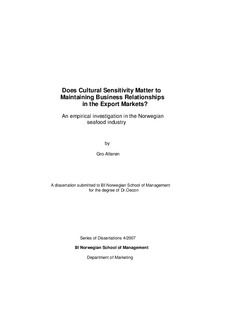Does Cultural Sensitivity Matter to Maintaining Business Relationships in the Export Markets?: An empirical investigation in the Norwegian seafood industry
Doctoral thesis
Permanent lenke
http://hdl.handle.net/11250/94278Utgivelsesdato
2007Metadata
Vis full innførselSamlinger
Sammendrag
The aim of this study is twofold. The first aim is to develop the cultural sensitivity concept. A review of literature, including literature focusing on international business, marketing, and adaptive selling, has provided the basis from where the cultural sensitivity concept has been developed. This study proposes a model of the concept as multi-dimensional. Cultural sensitivity is perceived as a competence, held by a person responsible for sales in the export markets. Experience is viewed as essential to advance a salesperson’s cultural sensitivity. The dimensions, and thus the variables composing cultural sensitivity, are as follows: international experience, country experience, open-mindedness, adaptive business style, and ongoing business experience. The measurement scales were adopted from previous research, but were accommodated to the context studied.
The second aim of this study is to investigate the extent to which the various dimensions of cultural sensitivity are important to the maintaining of business relationships in export marketing channel contexts. The empirical setting is the Norwegian seafood export industry with selected business partners in the export markets. The sample consists of 111 cases, and regression analyses were conducted to test 12 hypotheses. The conceptual model proposes that the five variables that compose cultural sensitivity have different roles. International experience, country experience and open-mindedness are hypothesised to have an impact on relational qualities (trust between exchange partners and exchange of information) indirectly through adaptive business style. The findings give support to this view. These three variables do not have significant effects on trust and exchange of information directly. The findings show that country experience and open-mindedness have positive and significant effects on an adaptive business style.
The findings show that adaptive business style does not have a significant impact on trust between exchange partners. Adaptive business style has a significant impact on exchange of information, though only at a p <.10 level. Ongoing business experience is viewed as a moderator variable. It is expected to strengthen the relationship between adaptive business style and trust, and the relationship between adaptive business style and exchange of information. The results show that the former relationship is strengthened from a non-significant to a significant relationship. The significance is though only at a p < .10 level.
Serie
Series of Dissertations4/2007
